It has been stated that as veterinarians we lose a patient or deal with death, an average of five times that of human doctors. This might be a combination of the fact that euthanasia is a legal and a viable option for our patients. Furthermore, the average life span of our patients is much shorter than our human counterparts. Therefore, death and dying are a very real and ubiquitous part of veterinary medicine.
As a veterinarian, clearly one way to make this easier would be to turn off our emotions and become hardened to the very important and very permanent act that we are performing. The burden of this decision is a lot to bear — for the veterinarian and for the client. However, I think it goes without saying, that most veterinarians are unable to do this. We are unable to just turn off our emotions when needed. Furthermore, most of us ask ourselves, if it were possible to turn off our emotions, would we still be considered good veterinarians? And in fact, should we still be practicing veterinary medicine? (A fully functional veterinarian but an indifferent and hardened one?) The answer, I would think, is a universally, resounding NO. If regrettably, we somehow lapsed into this type of mentality, then it would completely undermine the very reason why we all become veterinarians – to help, to heal and to ease the suffering in our animal patients, while providing compassion, comfort and maintaining empathy for their owners.
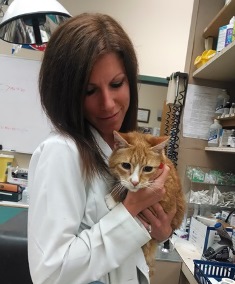
Often, people acknowledge this and owners will comment, “I don’t know how you do this part of your job.” Or “This must be so difficult to do all the time.” But every once in a while someone will say, “You must be so used to this” or “You must be numb to this by now.” And that could not be further from the truth. I can honestly say that each and every euthanasia is sad; each one is painful and my heart goes out to each and every owner and family who loses a pet. However, as veterinarians we do learn how to recognize and assess animal suffering and their quality of life. So most of us actually find comfort in knowing that the action we are performing, although a fatal one, is still in the best interest of our patient.
In veterinary medicine the quality of our patient’s lives trumps the quantity. Sure we would love our animals to be around longer, but if this comes at the expense of them being able to run and play and interact happily with their owners, then is it really worth it? So even though we think of the job of the veterinarian as being someone who is saving lives and making the sick animals better; NOT letting our patients suffer unnecessarily is equally as important.
With that being said, knowing when the right time is to make this decision can be very intimidating and difficult. Sometimes it is very obvious. But more often than not, our patients develop chronic diseases, chronic pain and terminal illnesses, which have very slow and insidious declines. Frequently owners ask me, “Can’t we just wait for him/her to pass away at home?” Occasionally this may happen quickly, naturally and peacefully (and often unpredictably). But as veterinarians, we do try to discuss that “waiting” for an animal to pass away naturally can take a very very long time and often it is a not a peaceful passing. Typically, owners and veterinarians agree, that first and foremost, they do not want their pets to suffer.
As veterinarians we try to help owners step back and assess their pet’s quality of life. Even though humane euthanasia is the last thing we want to suggest, sometimes it is the best decision for the pet. There are sometimes very subtle or particular signs of pain and discomfort that we are trained as veterinarians to recognize. And other times we rely on owners to describe to us what the pet is like at home. We use such things as pain, mobility, appetite, hydration, happiness and hygiene. In general, are there more bad days than good days? This process is a team effort. Clients and veterinarians work together to determine if a patient’s quality of life is acceptable or not and whether or not their pet is suffering. Ultimately this decision is the owner’s decision. But we, as veterinarians, are here as very important guides and resources. This is what we are trained to do.
The actual act of euthanasia for our pets is very peaceful. Owners can be present the entire time with their pet. We typically do this in the hospital. However, a “house-call” euthanasia is possible. I find that for most pets this is a wonderful option if he or she doesn’t like the car ride or coming to the veterinary hospital.
This brings me to the story (and pictures) of a very wonderful patient, Luca. Luca was an 11 year old German Shepherd who was diagnosed with a very malignant tumor. For over a year Luca’s wonderful owners managed his pain and kept infection at bay. However, recently it was assessed that Luca’s tumor and discomfort were escalating. His mass became very infected and was impairing his quality of life. The owners selflessly decided that this was not fair for Luca and wanted him to pass peacefully with the family. We arranged a “house-call” euthanasia the following day.
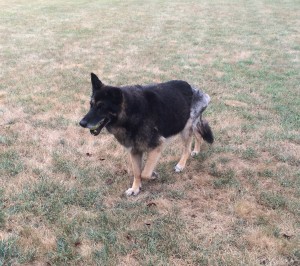
When I arrived at the family home, Luca was sitting outside under his favorite tree with his family. His owner threw a tennis ball for him to fetch a few times. Luca very loyally brought the ball back for his owners. And being the protector that he was, Luca immediately barked and warned his owners of my presence when I walked across the front yard. Once his owners said it was okay, he happily greeted me.
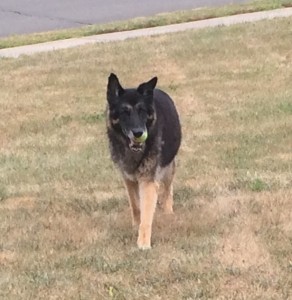
Together we all sat on the grass and we gave Luca his sedative. As Luca began to get sleepy we all started to well up with tears. Luca placed his weary head on his female owner’s lap. She kissed him and told him how much he meant to the family; how much he meant to her. He had been a loyal protector, a companion, and a friend. And she recognized that considering how much he gave to her and the family, this was the least she could do for him – to let him pass away peacefully, happily…with his family by his side.
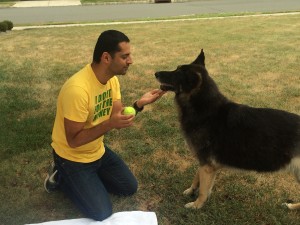
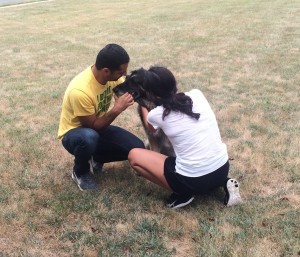
After he was gone, we all cried and we hugged and we reminisced. But one thing we did not do was regret the decision to ease Luca’s suffering and to help him pass peacefully. It was beautiful to watch him with his family and it was a beautiful passage of a pure soul leaving this world to go on to whatever might be next… A pastor once told me that Will Rogers said, “If there are no dogs in Heaven, then when I die, I want to go where they go.” Animals give us so much happiness, loyalty and companionship. It seems to me that it is our duty to help them die peacefully and without suffering.
Recommended Reading:
Helping children through pet loss
Pet loss support and grief counseling
Heather Simon-Buonocore, VMD, Belle Mead Animal Hospital
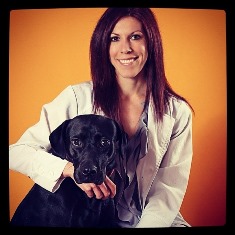
Heather Simon-Buonocore, VMD, Belle Mead Animal Hospital


